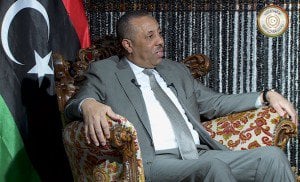By Libya Herald reporter.

Beida, 3 January 2015:
Reports earlier this week that Prime Minister Abdullah Al-Thinni is considering resigning are untrue, the . . .[restrict]Libya Herald has been told.
“They are false rumours”, a senior government official said, asking not to be named.
The London-based Arabic daily Asharq Al-Awsat had quoted an unnamed government minister saying that a “tired and exhausted” Thinni wanted to retire and that some five candidates were vying to replacing him.
Thinni certainly did not appear tired at Thursday’s cabinet meeting discussing cost-cutting measures and the need to ensure full telecommunications coverage in the east of the country.
Originally appointed temporary prime minister last March by the General National Congress after it sacked Ali Zeidan, Thinni has managed to regualrly outmanoeuvre those who have tried to dismiss him. Last May, Congress decided by a large majority to replace him with Ahmed Maetig, only to see its vote overturned on a legal technicality by the Supreme Court the following month and then evaporate when Maetig accepted the decision.
Thinni was reappointed as prime minister by the House of Representatives (HoR) at the beginning of September, a month after it started its sessions.
Although there is known to be a significant body in the House that would like to replace him, it does not command a majority. Similarly, UN Special Envoy Bernardino Leon and some of the other international special envoys are also said to want him to go in the belief that a prime minister acceptable to both sides of the Libya crisis could then be appointed.
Despite this, there are those who say that regardless of the Supreme Court’s decision in November on the legality of the Congress’ vote that cleared the way to the HoR’s elections in June, he and not Omar Al-Hassi is still the legal prime minister. They do so on the grounds that with just 20 members at the meeting which appointed Hassi as prime minister, Congress’ own rules on a quorum were broken. [/restrict]







